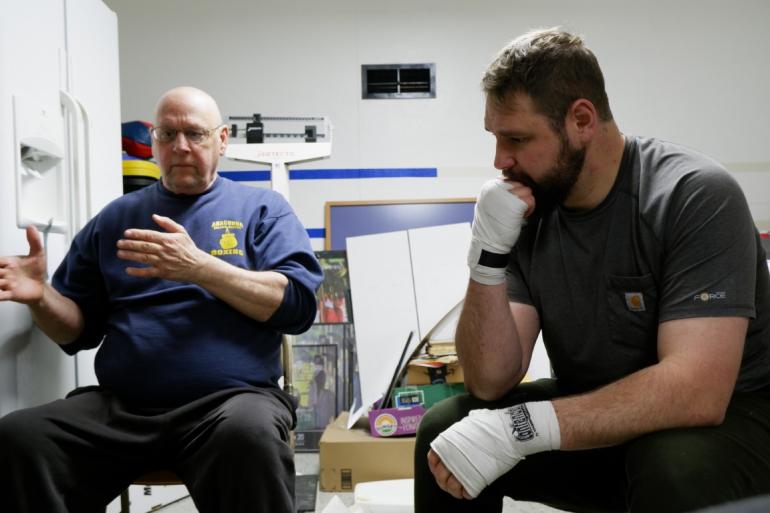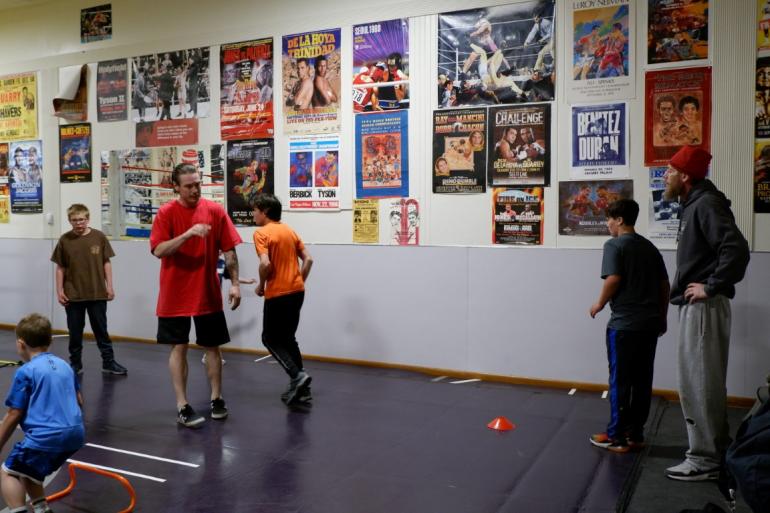Rolling with the Punches

The dawn-tinted building on Park Avenue stands inconspicuous to outsiders in Anaconda, Montana. In black paint, the sign on its facade reads, “Fuller Drug Co.” The sign is peeling and weathered.
Peek inside, though, and you’ll find old posters of past champions and great boxers hung on the walls carefully. Deliberately. This is the new home of Anaconda’s boxing gym.
Although the location of the gym has changed many times, one thing stays the same: young fighters returning to lace up gloves time and time again. Why?
“I started boxing 14 years ago when I was in the eighth grade because I was bullied,” said Eric Hempstead, professional boxer (37-4) and USA Boxing coach. “I wasn’t interested in boxing when I started and I never thought I’d continue doing it.”
Hempstead explained he was never interested in sports growing up. Now, Hempstead has 30 knockouts under his belt.
“I wouldn’t do anything if someone was picking on me, and I didn’t know how to defend myself,” said Hempstead. “I was getting picked on so much by people older than I was and I’d get beat up. I finally decided I had enough.”
Hempstead was recruited by a childhood friend to start learning how to defend himself. Not fight, but to learn the means to stand up for himself and others when necessary.
It was then that he met Chris Eamon, USA Boxing coach and retired boxer. Eamon started boxing in 1967 and started coaching on and off in 1978.
Eamon is now retired, but continues his love for boxing through his boxing gym in Anaconda.
“I started boxing for the same reason Eric started. There were mean guys in my life, so I started boxing at the YMCA when I moved to Sacramento from Anaconda in 1967,” said Eamon. “Boxing gave me confidence. I felt like I was reborn.”
Eamon relayed the knowledge he gained throughout his boxing career to anyone that wanted to learn, including Hempstead.
“People weren’t picking on me anymore, but I couldn’t stand bullies. I’d try to recruit kids that were having problems to box because that is what helped me,” said Hempstead.

Both Eamon and Hempstead explained that recruiting young fighters was a lot easier back in the day. Hempstead said some kids that he recruited didn’t stick with it because “it is difficult.”
“Everything in boxing is super simple and that’s why it’s so difficult because the movements are simple and it’s hard to learn how to let go of everything. You have to put in over 10,000 hours into perfecting one punch,” said Hempstead. “The physics is simple, but learning it is the hardest part.”
Eamon and Hempstead want to make sure that everyone they recruit is prepared for life. They say boxing is closer to life than any other sport. You get what you put into it.
“We want to help make their lives easier when they get older. Life has gotten too covered in bubble wrap for kids, especially when you’re living in a small town. I didn’t realize how good I had it until I left,” said Hempstead. “Kids don’t have the kind of responsibilities and the kind of life the generations before them had. Everyone wants to make their children’s lives easier; who wouldn’t want to do that? But, at the same time, there’s a fine line between making their life easier and making it too easy. Because then, kids don’t grow up to have real expectations of the world. They don’t just turn 18 years old ready to handle what the world will do to them.”
Hempstead explained that boxing is the toughest sport anyone can get into, but once they do, it teaches them so much more than any other sport.
“Boxing makes everyone a better person. I don’t advocate boxing as a career choice. Boxing is a cruel and lonely sport. You’ll go into boxing with high hopes and you’ll get beaten down, but it teaches you life experiences. You don’t just get to walk in the ring and have everything handed to you,” said Hempstead.
Rex Lewis, a former Anaconda boxer, has had a total of 10 fights. He started boxing when he was 14 years old. His grandfather and father taught him that defending yourself is one of the most important things you can learn.
“My grandfather coached Anaconda’s amateur boxing team and my dad boxed as well. Boxing just helped me gain confidence in life and a work ethic,” said Lewis. “Once you start boxing, it makes you feel like you can tackle anything. It’s your will against someone else’s – that’s a very powerful feeling.”
Lewis wishes he started sooner to gain the skills boxing teaches you inside and outside the gym.
“You have respect for your opponent and you learn to leave your ego at the door. It’s very humbling. Every boxer has been humbled at some point and that’s good for your character. I can say that it definitely made me a better person. Giving something your all is so rewarding, win or lose.”
One goal Eamon and Hempstead have is to help kids build good character.
“We get low-income, high-risk kids and kids from all walks of life. It’s a good thing for kids to get into before they get older. Kids that don’t like team sports learn so much about themselves in boxing. There’s a very big mental component to it,” said Eamon. “We want them to be able to face life with a strong mind which boxing teaches. Life is a fight. Everything is becoming competitive.”
Boxing is a sport that focuses on the fundamentals, Hempstead explained.
“You will have to fight for everything in your life when you step out into the world. You will have to fight for your job. You will have to fight for your relationships. You will have to fight for your place. Everything you do out in the world requires confidence and boxing gives you that,” said Hempstead.
Hempstead explained that there is a lot of heartbreak in boxing that one learns and becomes prepared for. Every week, Eamon, Hempstead and other trainers teach a group of youths from Anaconda and neighboring towns.
Jay Wisniewski, a boxing gym member, started boxing in his late 20s and found that it’s one of the few sports that gives you instant feedback. If a mistake is made, the punishment is around the corner.
“I wish I started sooner because even with the violent impacts, it’s a great sport. It teaches you a lot about others as much as it teaches you about yourself,” Wisniewski said. “You learn a lot about how patient someone is and how much self-control they have when you get into the ring with them. If I had a child, I’d have him or her take up boxing to learn the discipline.”
Wisniewski explained that it’s not brute force that guarantees a win. It’s the technique.
“It’s not the person who is born tougher or bigger. It’s the person that has the discipline to do the same thing over and over again until they have mastered it,” said Wisniewski.
Wisniewski has seen kids come into the boxing gym bouncing off the walls, but after a few weeks, they have more focus, respect and discipline. He explained that you don’t have to become a professional to reap the benefits. Learning the fundamentals and basics seeps into life.
“When you’re tired in the third round and you have someone relentlessly beating you down, you need to find a way to keep going. Life is the same way. Are you going to just give up or are you going to fight?” said Hempstead. “The fight isn’t won in the ring. It’s won in the gym. It’s the time, effort and hard work you put into yourself to get to the ring. You prepare yourself for the hardship. In life, you have to do the same. You need to have the tenacity and the drive. That’s why we want to keep recruiting more kids to teach them that.”
With boxing, there are lessons to be learned. Lessons one has to learn on his or her own. The importance of self-discovery and knowing what one is capable of is the foundation for the sport.
When you hear the ringing of the bell. When you are worn out. When you feel beaten down, whether that’s inside the ring or out, will you get back up?
